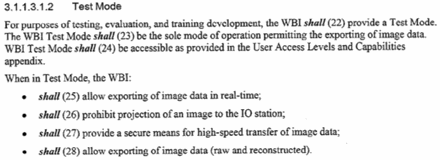Freedom of Information Act Gallery 2010
In recognition of Sunshine Week
March 15-19, 2010
Introduction
The Freedom of Information Act establishes a legal right for individuals to obtain records in the possession of government agencies. The FOIA is critical for the functioning of democratic government because it helps ensure that the public is fully informed about matters of public concern. The FOIA has helped uncover fraud, waste, and abuse in the federal government. It has become particularly important in the last few years as the government has tried to keep more of its activities secret.
A hallmark of the new surveillance measures proposed by various government agencies is their disregard for public accountability. As the government seeks to expand its power to collect information about individuals, it increasingly hides that surveillance power behind a wall of secrecy. Congress has long recognized this tendency in the Executive Branch, and sought to limit government secrecy by creating legal obligations of openness under the FOIA and the Privacy Act of 1974. EPIC has used these open government laws aggressively to enable public oversight of potentially invasive surveillance initiatives.
Public access through the FOIA not only allows for a more informed public debate over new surveillance proposals, but also ensures accountability for government officials. Public debate fosters the development of more robust security systems and leads to solutions that better respect the nation's democratic values. EPIC's FOIA litigation activity over the past year has resulted in disclosure of information about several government surveillance programs. The EPIC FOIA Gallery highlights some of the most significant documents we obtained in the past year.
Body Scanners Can Store Naked Images

Through Freedom of Information Act litigation, EPIC obtained contracts and technical specifications for body scanners, machines used to perform digital strip searches of air travelers. The documents include 250 pages of technical data. They reveal that scanners can record, store, and transmit images of Americans stripped naked. This contradicts assurances made by the Transportation Security Administration. The TSA withheld additional records sought by EPIC, including full-resolution body scanner images and documents detailing traveler complaints. EPIC's lawsuit for additional records remains pending.
Air Travelers Object to Digital Strip Searches

Responding to an EPIC FOIA lawsuit, the Department of Homeland Security and the Transportation Security Administration released documents about body scanners in US airports that included complaints from travelers who went through the devices. Travelers reported that they were not told about a pat down alternative or that they were going to be subject to a body scan by TSA officials. Travelers also expressed concern about radiation risks to pregnant women, and the image capture of young children without clothes.
Defense Department Pulls "Parental Control" Software After EPIC Complaint

Following a FOIA request, EPIC obtained documents that revealed the Defense Department canceled a contract with Echometrix following an EPIC complaint to the FTC in 2009. Echometrix produces parental control software that monitors children’s online activity. Echometrix analyzes the information collected from children and sells the data to third parties for market-intelligence research. The EPIC complaint alleges that Echometrix engages in unfair and deceptive trade practices by representing that the software protects children online while simultaneously collecting and disclosing information about children’s online activity. Subsequently, the Army and Air Force Exchange Service pulled My Military Sentry, which collects data for marketing purposes, from its online store. The FTC has not yet pursued action against the software company.
Feds Exempt Social Media Companies from Privacy Requirements

In response to EPIC’s April 2009 FOIA request, the General Services Administration released several contracts between the federal government and web 2.0 companies. The GSA Agreement with Google exempts the company from privacy requirements, stating: “to the extent any rules or guidelines exist prohibiting the use of persistent cookies in connection with Provider Content applies to Google, Provider expressly waives those rules or guidelines as they may apply to Google.” The documents also include agreements with Blip.tv, Blist, Google (YouTube), Yahoo (Flickr), and MySpace. EPIC also obtained amendments to agreements with Facebook, Slideshare.net, Vimeo.com, and AddThis.com. Some of the agreements permit companies to track users of government web sites for advertising purposes.
EPIC Renews Call for Release of Bush Warrantless Wiretap Memos

In September 2009, EPIC and the ACLU filed court papers in Washington, DC asking a federal judge now reviewing an open government case to consider the publication of the Inspectors General Unclassified Report on President Bush's warrantless wiretapping program. EPIC is seeking the release of the relevant legal memos relating to the program, but the government contends that the entire matter is secret. However, the Inspector General's report, which is widely available, discusses several of the memos at issue in the case. EPIC filed the original request for the legal memos in December 2005 after the New York Times first reported on the warrantless wiretapping program. The case is EPIC v. Dep't of Justice.
DHS Spends Millions to Promote Error-Filled E-Verify System

In response to a January 2009 FOIA request to the Department of Homeland Security, EPIC obtained documents revealing that the DHS spent $3 million on a marketing and advertising campaign to promote its E-Verify system. The DHS contracted with Maya Advertising and Communications to launch a campaign “to increase voluntary adoption of the [Employment Eligibility Verification Program] for all sectors of US employers.” In 2007, EPIC testified in Congress that the employment eligibility database is filled with errors and warned that determination errors are likely. Errors can seriously harm American workers, because they can lead to American citizens losing their jobs. EPIC has documented how the use of such a database imposes problems for U.S. workers.
Share this page:
Subscribe to the EPIC Alert
The EPIC Alert is a biweekly newsletter highlighting emerging privacy issues.







